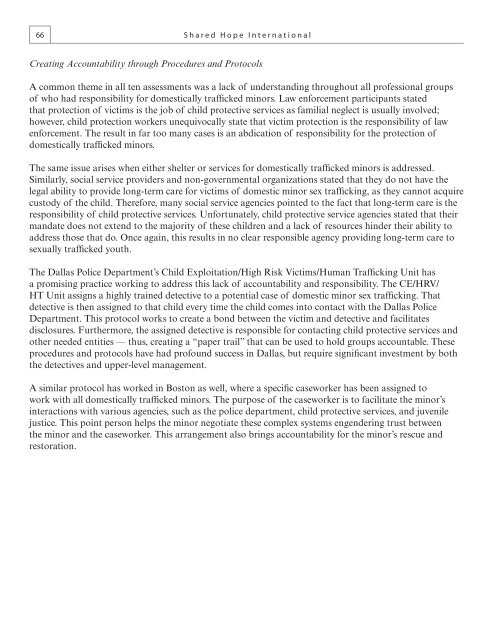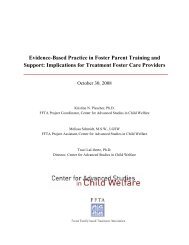The National Report on Domestic Minor Sex Trafficking: America’s Prostituted Children 65for social service agencies, prosecutors, juvenile justice workers, and child protective services. Manyagencies report utilizing generic or adult-oriented intake and interviewing procedures that do notincorporate any DMST specific questions or take into account the psychological, social, and criminalelements of domestic minor sex trafficking.Conversely, when entities gear their interviews to incorporate the dynamics of domestic minor sextrafficking, such as trauma bonds, pimp control, severe chronic trauma, learned hostility, etc., a higherlevel of trust is obtained from the youth, along with greater disclosure of information. Some promisinginterviewing approaches to working with domestically trafficked minors are:1. Planning on multiple meetings with the victim in order to build trust and rapport. Once trust isbuilt, then a forensic interview can be conducted where reliable information is more likely to begained.2. Using victim-centered approaches that place the safety and needs of the victim first rather thanfocusing on information about the trafficker/pimp through a flip-interview.3. Interviewing a domestically trafficked minor in an environment conducive to her status as a victimand a minor, such as at a social service agency or office, rather than an interview room used forsuspects.4. Being cognizant of the crime of domestic minor sex trafficking when deciding on where to conductinterviews. For example, it is inappropriate for a child who has been commercially sexuallyexploited to be interviewed in a hotel or motel given that the minor has likely been raped in such anenvironment.5. Having experienced interviewers or a survivor of sex trafficking either conduct or be present at theinterview can assist in establishing trust. These professionals understand the dynamics of pimpcontrol and the resulting behavior, such as trying to manipulate their way out of the situation orrefusing help, and viewing law enforcement and social services as enemies.6. Gender-appropriate interviewing is vital; however, this does not mean that a uniform protocol mustbe set (i.e. a woman always interviews a girl or a male always interviews a boy). Rather, genderdynamics must be accounted for and assessed in that particular situation.7. Weapons and uniforms are likely to trigger defense mechanisms and should not be worn whileinterviewing a potential victim.8. Using language that is relevant to the victim such as identifying and asking about her “boyfriend”before labeling him as a trafficker/pimp.Victim-witness interviews require the same sensitivity during the investigation phase as well as theprosecution phase. Prosecutors reported a preference for live testimony from the child victim in court.Some prosecutors stated it was required under Crawford v. Washington, a federal court decision holdingthat testimonial statements made outside of court proceedings are not admissible unless the person whomade the statement is unavailable for testimony at the trial and the defense has had a prior opportunityto cross-examine the declarant. 183 Even in those locations with child advocacy centers capable of closedcircuit testimony for sexual abuse victims, this victim-friendly technology was not accessed in casesinvolving commercially sexually exploited children. This was noted as a gap in protecting the child victimwitnessin the investigation and prosecution phase.183Wade, Domestic Minor Sex Trafficking Assessment Report — Independence, Missouri, pg. 55, citing Crawford v. Washington,541 U.S. 36. 2004.
66Shared Hope InternationalCreating Accountability through Procedures and ProtocolsA common theme in all ten assessments was a lack of understanding throughout all professional groupsof who had responsibility for domestically trafficked minors. Law enforcement participants statedthat protection of victims is the job of child protective services as familial neglect is usually involved;however, child protection workers unequivocally state that victim protection is the responsibility of lawenforcement. The result in far too many cases is an abdication of responsibility for the protection ofdomestically trafficked minors.The same issue arises when either shelter or services for domestically trafficked minors is addressed.Similarly, social service providers and non-governmental organizations stated that they do not have thelegal ability to provide long-term care for victims of domestic minor sex trafficking, as they cannot acquirecustody of the child. Therefore, many social service agencies pointed to the fact that long-term care is theresponsibility of child protective services. Unfortunately, child protective service agencies stated that theirmandate does not extend to the majority of these children and a lack of resources hinder their ability toaddress those that do. Once again, this results in no clear responsible agency providing long-term care tosexually trafficked youth.The Dallas Police Department’s Child Exploitation/High Risk Victims/Human Trafficking Unit hasa promising practice working to address this lack of accountability and responsibility. The CE/HRV/HT Unit assigns a highly trained detective to a potential case of domestic minor sex trafficking. Thatdetective is then assigned to that child every time the child comes into contact with the Dallas PoliceDepartment. This protocol works to create a bond between the victim and detective and facilitatesdisclosures. Furthermore, the assigned detective is responsible for contacting child protective services andother needed entities — thus, creating a “paper trail” that can be used to hold groups accountable. Theseprocedures and protocols have had profound success in Dallas, but require significant investment by boththe detectives and upper-level management.A similar protocol has worked in Boston as well, where a specific caseworker has been assigned towork with all domestically trafficked minors. The purpose of the caseworker is to facilitate the minor’sinteractions with various agencies, such as the police department, child protective services, and juvenilejustice. This point person helps the minor negotiate these complex systems engendering trust betweenthe minor and the caseworker. This arrangement also brings accountability for the minor’s rescue andrestoration.
















